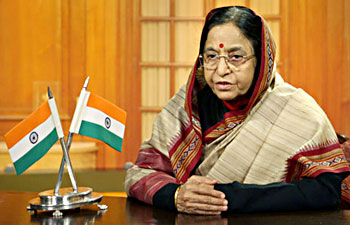 Powers of Indian President encompass a wide array of activities. The Indian President is at the head of the Union Government, and thus he exercises extensive powers in the administration of the country. The powers of the President in various areas of governance are discussed below.
Powers of Indian President encompass a wide array of activities. The Indian President is at the head of the Union Government, and thus he exercises extensive powers in the administration of the country. The powers of the President in various areas of governance are discussed below.
Executive Powers of Indian President
The executive power of the Union is vested in the President and is exercised by him through officers subordinate to him in accordance with the provisions of the Constitution of India. There is a Council of Ministers headed by the Indian Prime Minister, to aid and advice the President. The President appoints the Prime Minister, and other Ministers are appointed by him on the advice of the Prime Minister. As India has a parliamentary system of Government, it is the leader of the majority party who is appointed as the Prime Minister. The ministers hold office during the pleasure of the President. He makes rules for the convenient transaction of business of the Government of India and allocates business among Ministers.
The President appoints Governors, ambassadors and other diplomatic representatives; the Chief Justice and other Judges of the Supreme Court, the Chairman and other members of the Union Public Service Commission, the Attorney-General and Auditor-General of India, the Chief Justice, and Judges of the State High Courts etc. Besides, the President also appoints various Commissions such as the Finance Commission, the Election Commission etc. All the officers of the Union are the officers of the President and as such his subordinates. He has the right to be informed of all affairs of the Union.
The President has the power to remove his Ministers, the Attorney-General of India and the Governors of the States. In dismissing Ministers he has to follow the principles of parliamentary system of government. In the matter of dismissing other officers he has to act on the advice of the Minister or act according to rules laid down by the Indian Parliament. All executive actions of the Union Government are taken in the name of the President. All contracts and assurances of property made on behalf of the Government of India are expressed to be made by the President and executed in such a manner as the President may direct.
Powers of Indian President in Military and Foreign Affairs
The constitution vests the Supreme Command of the Defence Forces in the President, which he is required to exercise in accordance with law. Declaration of war and conclusion of peace are exclusive executive functions. The executive power relating to foreign affairs is exercised by the Union Government and all the diplomatic business is conducted in the name of the President. Diplomatic envoys and consular agents are accredited to him. All treaties and international agreements are negotiated and concluded in the name of the President.
Legislative Power of Indian President
The legislative powers of the President are given in Article 79 of the Constitution. He summons and prorogues Parliament and dissolves the House of the People. In dissolving the House of the People (Lok Sabha) the President has to act on the advice of the Council of Ministers headed by the Prime Minister. Apart from this he has extensive rights in the functioning of the parliament-he has the right to address and send messages to Parliament; he may address either House of Parliament or both Houses assembled together; he recommends legislation for the reorganization of States or alteration of boundaries or name of any of the States; he sanctions the introduction of Money Bills, Bills involving expenditure etc; he has the right to withhold his assent to a Bill passed by both houses of Parliament and he may also resend any non-money Bill for re-consideration; he may summon a joint sitting of the two houses of Parliament in certain circumstances.
Judicial Powers of Indian President
The President has the power to grant pardons, reprieves, respites or remissions of punishment or to suspend, remit or commute sentences of any person convicted of offence:
(a) in all cases where the punishment or sentence is by a Court Martial;
(b) in all cases where the punishment or sentence is for an offence against any law relating to a matter to which the executive power of the Union extends; and
(c) in all cases where the sentence is a death sentence.
Emergency Powers
Besides the powers enumerated above, the President exercises vast emergency powers. Three kinds of emergency may be declared by the President- National, State and Financial Emergency. During times of emergency, the President exercises his discretionary powers, and in case of national emergency the suspension of the autonomy of the states as well as of fundamental rights is seen.
Thus discussed are the powers of the President of India.




















